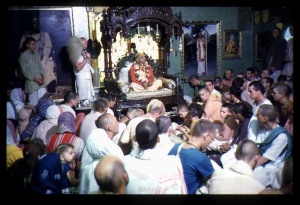CC Antya 16.149 (1975): Difference between revisions
(Vanibot #0027: CCMirror - Mirror CC's 1996 edition to form a basis for 1975) |
(Vanibot #0020: VersionCompareLinker - added a link to the Version Compare feature) |
||
| Line 2: | Line 2: | ||
<div style="float:left">'''[[Sri Caitanya-caritamrta (1975)|Śrī Caitanya-caritāmṛta (1975)]] - [[CC Antya (1975)|Antya-līlā]] - [[CC Antya 16 (1975)|Chapter 16: Lord Śrī Caitanya Mahāprabhu Tastes Nectar from the Lips of Lord Śrī Kṛṣṇa]]'''</div> | <div style="float:left">'''[[Sri Caitanya-caritamrta (1975)|Śrī Caitanya-caritāmṛta (1975)]] - [[CC Antya (1975)|Antya-līlā]] - [[CC Antya 16 (1975)|Chapter 16: Lord Śrī Caitanya Mahāprabhu Tastes Nectar from the Lips of Lord Śrī Kṛṣṇa]]'''</div> | ||
<div style="float:right">[[File:Go-previous.png|link=CC Antya 16.148 (1975)|Antya-līlā 16.148]] '''[[CC Antya 16.148 (1975)|Antya-līlā 16.148]] - [[CC Antya 16.150 (1975)|Antya-līlā 16.150]]''' [[File:Go-next.png|link=CC Antya 16.150 (1975)|Antya-līlā 16.150]]</div> | <div style="float:right">[[File:Go-previous.png|link=CC Antya 16.148 (1975)|Antya-līlā 16.148]] '''[[CC Antya 16.148 (1975)|Antya-līlā 16.148]] - [[CC Antya 16.150 (1975)|Antya-līlā 16.150]]''' [[File:Go-next.png|link=CC Antya 16.150 (1975)|Antya-līlā 16.150]]</div> | ||
{{CompareVersions|CC|Antya 16.149|CC 1975|CC 1996}} | |||
{{RandomImage}} | {{RandomImage}} | ||
==== TEXT 149 ==== | ==== TEXT 149 ==== | ||
<div class="verse"> | <div class="verse"> | ||
:veṇura tapa jāni yabe, | :veṇura tapa jāni yabe, sei tapa kari tabe, | ||
: | :e--a yogya, āmarā--yogyā nārī | ||
:yā nā pāñā duḥkhe mari, | :yā nā pāñā duḥkhe mari, ayogya piye sahite nāri, | ||
:tāhā | :tāhā lāgi' tapasyā vicāri | ||
</div> | </div> | ||
| Line 20: | Line 19: | ||
<div class="synonyms"> | <div class="synonyms"> | ||
veṇura—of the flute; tapa—austerities; jāni—knowing; yabe—when; sei—those; tapa—austerities; kari—we perform; tabe—at that time; e—this (flute); ayogya—unfit; āmarā—we; yogyā nārī—fit women; yā—which; nā pāñā—not getting; duḥkhe—in unhappiness; mari—we die; ayogya—the most unfit; piye—drinks; sahite nāri—we cannot tolerate; tāhā | veṇura—of the flute; tapa—austerities; jāni—knowing; yabe—when; sei—those; tapa—austerities; kari—we perform; tabe—at that time; e—this (flute); ayogya—unfit; āmarā—we; yogyā nārī—fit women; yā—which; nā pāñā—not getting; duḥkhe—in unhappiness; mari—we die; ayogya—the most unfit; piye—drinks; sahite nāri—we cannot tolerate; tāhā lāgi'-for that reason; tapasyā—austerities; vicāri—we are considering. | ||
</div> | </div> | ||
| Line 27: | Line 26: | ||
<div class="translation"> | <div class="translation"> | ||
"The gopīs considered, 'The flute is completely unfit for his position. We want to know what kind of austerities the flute executed, so that we may also perform the same austerities. Although the flute is unfit, he is drinking the nectar of Kṛṣṇa's lips. Seeing this, we qualified gopīs are dying of unhappiness. Therefore, we must consider the austerities the flute underwent in his past life.' " | |||
</div> | </div> | ||
Latest revision as of 22:55, 26 January 2020

A.C. Bhaktivedanta Swami Prabhupada
TEXT 149
- veṇura tapa jāni yabe, sei tapa kari tabe,
- e--a yogya, āmarā--yogyā nārī
- yā nā pāñā duḥkhe mari, ayogya piye sahite nāri,
- tāhā lāgi' tapasyā vicāri
SYNONYMS
veṇura—of the flute; tapa—austerities; jāni—knowing; yabe—when; sei—those; tapa—austerities; kari—we perform; tabe—at that time; e—this (flute); ayogya—unfit; āmarā—we; yogyā nārī—fit women; yā—which; nā pāñā—not getting; duḥkhe—in unhappiness; mari—we die; ayogya—the most unfit; piye—drinks; sahite nāri—we cannot tolerate; tāhā lāgi'-for that reason; tapasyā—austerities; vicāri—we are considering.
TRANSLATION
"The gopīs considered, 'The flute is completely unfit for his position. We want to know what kind of austerities the flute executed, so that we may also perform the same austerities. Although the flute is unfit, he is drinking the nectar of Kṛṣṇa's lips. Seeing this, we qualified gopīs are dying of unhappiness. Therefore, we must consider the austerities the flute underwent in his past life.' "